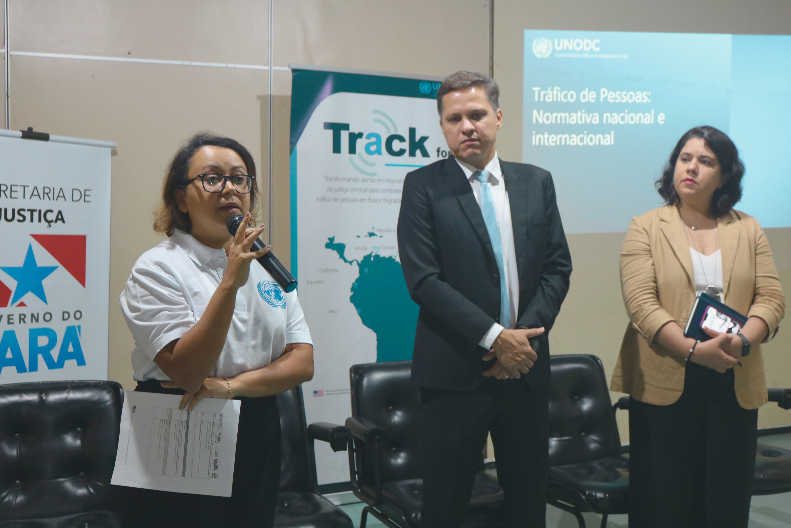
Belem, Para, 15 December 2023 – In partnership with the Ministry of Justice and Public Security (MJSP) and the Secretariat of Justice of the State of Pará (SEJU/PA), the United Nations Office on Drugs and Crime in Brazil (UNODC) carried out, through the Project Track4TiP, a training about human trafficking for the network of social assistance (SUAS) and health (SUS), in an event of capacitation which took place in the city of Belém, Para, from 14 to 15 December.
With the presence of the MJSP's General Coordination of Combating Human Trafficking and Smuggling of Migrants (CGTEP), the training focused on topics such as state, federal and international policies for combating human trafficking; identification and humanized service for victims; smuggling of migrants in the Northern Region; and trafficking for the purposes of slave labour in the state of Pará. More than 60 professionals from the state's social assistance and health networks took part in the training.
The meeting also delved into the preparations for the construction of the IV National Plan to Combat Human Trafficking - a group activity conducted jointly by UNODC and the MJSP. UNODC Brazil is supporting the drafting of the IV Plan through a project funded by the Government of Sweden, the aim of which is to improve data and evidence-based information on the phenomenon of human trafficking in Brazil.

Alongside UNODC Brazil, the event was opened by Marina Bernardes, general coordinator of CGTEP/MJSP, and Raimundo Feliz, deputy secretary of SEJU/PA. In her presentation, Marina Bernardes detailed the national policy for combating human trafficking, addressed initiatives to expand and strengthen the network at both the national and state levels. Additionally, she discussed the federal government's prospects for 2024 - among which is the production of a new edition of the National Report on Human Trafficking, made in partnership with UNODC.
Throughout the two days of training, UNODC Brazil also gave a presentation on the prevalence of human trafficking for the purposes of slave labour in the gold mining sector in the region of the Tapajos River basin, in the state of Para, based on original data and studies prepared under the Tapajos Project.
Other institutions that took part in the training were the Migration, Gender, and Race Institute (I-MiGRa), the Pan American Development Foundation (PADF), the Reference and Assistance Center for Immigrants (CRAI) of the City of São Paulo, the Regional Council of Social Services (CRESS-AM) of the State of Amazonas and the National Center for Monitoring and Alerts of National Disasters (Cemaden).
Complementary agendas - In the days prior to the training, Track4TiP carried out a joint agenda of technical visits with the Ministry of Justice and Public Security, in Belém, state of Pará as part of regional consultations to better understand the needs of the state of Pará in responding to human trafficking and migrant smuggling in the context of Venezuelan migration.
UNODC Brazil and CGTEP/MJSP visited the State Secretariats of Justice (SEJU/PA) and Social Assistance, Labour, Employment and Income (SEASTER/PA) and the Tapanã institutional shelter, which cares for migrants from the Warao people. The main aim of the agendas and meetings is to strengthen local social assistance facilities for victims of human trafficking.
Track4TiP - TRACK4TIP is an initiative which will be implemented until 2024 by UNODC, with the support of the United States Department of State's Office to Monitor and Combat Trafficking in Persons (JTIP). The project, which began in 2019, benefits eight countries in South America and the Caribbean - Ecuador, Peru, Brazil, Colombia, the Dominican Republic, Trinidad and Tobago, Curaçao and Aruba - with national and regional actions.
The general objective of Track4TiP is to improve the regional criminal justice response to human trafficking in the migratory flows of the beneficiary countries, through a multidisciplinary and victim-centred approach, and actions at regional and national level to identify, prevent and prosecute cases.
***
This press release was made possible thanks to the support of the United States Department of State under Agreement No. SSJTIP19CA0027. The views expressed herein are those of the author(s) and do not necessarily reflect the views of the United States Department of State.